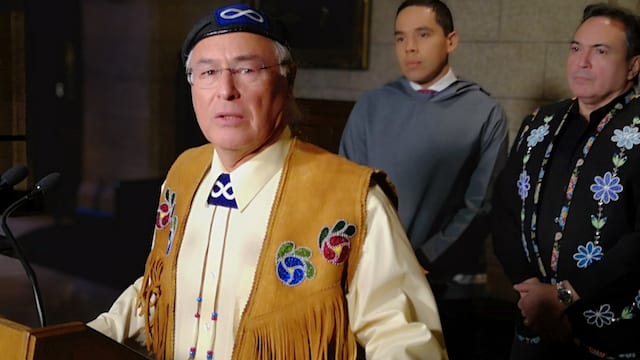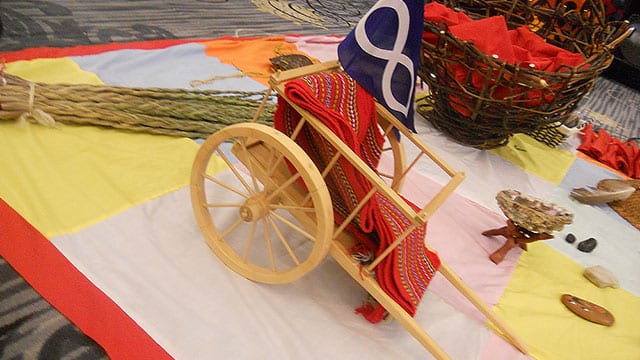
Metis National Council President Clement Chartier says he will retire once he's replaced but not election is scheduled. APTN file photo
The president of the Metis National Council (MNC) says he did not receive an invitation to the closing ceremony of the National Inquiry into Missing and Murdered Indigenous Women and Girls (MMIWG).
Clement Chartier says he only found out on Friday the final report would be released on Monday in Gatineau, Que.
“Throughout this whole process neither I, nor my office has been contacted by the commission” says Chartier.
Chartier says his concern is to what extent citizens of the Metis Nation were engaged in the national inquiry if the Metis Nation government was not.
“I personally was hoping to appear before the commission but did not receive, nor see any information as to where to appear,” he says.
“I am sure there must have been others in that same position.”
On an earlier episode of Face to Face, Chartier said he was also disappointed he did not have an opportunity to appear as an individual at the inquiry.
“My mother was brutalized and murdered and justice still hasn’t been done but I didn’t get that chance I looked for it but the Inquiry, never contacted my office at all,” he said.
Chartier said the only time he ever heard from commissioners was when they were looking for an extension.
In an email response to APTN News, a spokesperson for the Inquiry wrote “The National Inquiry’s Closing Ceremony is a public event, entry is open to all. We welcome the participation of those who can make it to the Museum of History in Gatineau to mark this historic event.”
“We are honoured by President Chartier’s interest in the National Inquiry’s Final Report and its Calls for Justice.”
Read More:
The commission calls Metis women the “forgotten people” in its final report.
“One of the most distinctive features of Métis experiences has been their existence as “forgotten people,” whereby their exclusion from many of the programs and services offered to their First Nations relatives has directly contributed to violence.
“Concerted efforts to separate them from First Nations relatives through the apparatus of the state and the history of colonization has further generated a hierarchy of identity, resulting in conflicts within the Métis community and drawing attention away from the ongoing marginalization that Métis women, girls, and 2SLGBTQQIA people face.”
Gabrielle Fayant is an Indigenous youth advocate from Fishing Lake Metis Settlement who now lives in Ottawa.
Fayant has mixed feelings about the national inquiry.
“I worry that the Metis Settlements have not been engaged in this process as the settlements are not represented by MNC,” she told APTN.
The Metis Settlements are a federation of eight land-based Metis communities in Northern Alberta.
“This is where my family comes from and in our family alone we have had two immediate family members that have been murdered, a sister and an auntie,” says Fayant. “Some families I know have lost up to four immediate family members.
“Many Settlement members have been greatly affected by this crisis however due to political interference and struggles about what national organization represents who, the Settlements have not been involved or engaged in this process.”
Fayant is one of three advisors for Indigenous Youth Voices, a federal government initiative established to work on the Truth and Reconciliation Commissions Calls to Action 66.
Read More:
Metis National Council takes aim at ‘so called’ Metis organizations
Metis organization set to release its own reporton on violence against Indigenous women and girls
Fayant feels Indigenous peoples at a grassroots level have, “had limited engagement in the inquiry due to high-level political control over the inquiry.”
“From my work with young people, I can only assume that over half, if not much more, of the MMIWG2S are under the age of 30,” says Fayant.
“I know that they are constantly harassed and scared for their safety with no avenues of protection. I am concerned that young people have not been engaged to the extent that they should be,” she says. “This crisis is often present in their day to day lives.
“My greatest concern of all is that like many of the hundreds of recommendations and requirements put forward to governments and Canadians, over decades, that this too will not be honoured.”
On Friday, the President of Les Femmes Michif Otipemisiwak (LFMNO), the organization that represents Metis women also expressed its concerns with the inquiry and said it will bring forward it’s own report for Metis on Monday.
Chartier says he is hopeful the final report will lead to meaningful change.
APTN News will have extensive coverage online aptnnews.ca and on its social media platforms.











